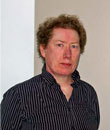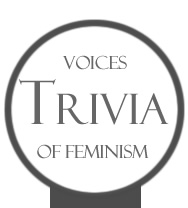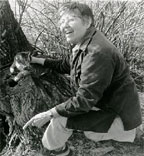Notes on reinvention and extinction*
Esther Shannon
I was quite young when I found my first lesbian. She wore a white dress shirt, buttoned right up and tucked precisely into the kind of dress pants my father wore when necessary. Her shoes were men's shoes. Her hair was cut short and brylcreemed. She had appeared suddenly in the kitchen of my girlfriend's older sister's boyfriend's home in Sydney, Cape Breton. She was the boyfriend's sister. His name was Robert. He was a homo and we all talked about why Nancy was going to marry a homo. She must know, we said. We never talked about his sister. What could you say?
The next time I found a lesbian, I was in high school. She was very tall, very skinny and very clumsy socially. Her hair was cut short and she wore shapeless sweaters and slacks, sometimes sweatpants. She stood out from the nuns. Once, when we were getting a presentation on manners from Anne Terry, the Cape Breton television star and the all-time best girl who ever graduated from Holy Angels High School, Anne mistook her for a man and asked her to leave the gym. Everyone knew why. I figured she'd be embarrassed, but why didn't she do something about it? Later, she kicked me off the basketball team for smoking.
The next time I found a lesbian, I was working at the Garfield Newsstand in the Toronto subway. It was 1969. I was busy, but I saw her coming. She was shorter than the first two lesbians I had found. Kind of squat. She wore a serious black leather jacket, waist length, with snaps and chains everywhere. She was – to use my mother's phrase – hard-looking. She had short hair, but she was there to buy a comb. At Garfield News, we sold combs in every colour – pink, light pink, medium pink, dark pink, and black. We sold combs with every kind of handle: long spiky handles for stabbing boyfriends; short wide handles for thick-handed, passive girls; combs with handles set in the middle meant for male and female black people. We had combs thick with teeth and combs with teeth set far apart, clearly meant to help women do certain things with long, curly hair. Even though I had never encountered a bull dyke, I knew she was a bull dyke. It followed that I knew exactly what kind of comb this bull dyke would want to buy. But, I still asked her. It made her impatient. She put her new comb in her back pocket. I had never seen a woman do that before, but I wasn't surprised to see her do it.
After that, I went to live in the country. I didn't find any lesbians in the country. Maybe that was because I didn't garden, or because you needed a man to have a baby back then, or because hippies were as homophobic as the guys in the hardware store, or because I wasn't a lesbian myself yet. (Once I had become a lesbian. I found that lesbians did live in the country. I also found a couple in the Glace Bay Legion, but that wasn't until many years later. They told me the lesbians in Kitchener, Ontario weren't at all friendly, which was why they had to come back home.) Just before I left the country, but after I became a lesbian, I went to Vancouver to see if I could find another lesbian. Angus, my then current boyfriend, told me to go to a bar called the Vanport. I went with my first woman lover who, like all the women in the country at that time, was not a lesbian. It was very late on a Friday night, and the place was packed with leather-jacketed bull dykes waving dubious pool cues in a menacing manner. Every once in a while, one of them would emphasize a statement by cracking her pool cue on the pool table. Many of the other patrons were women dressed in conventional female attire. Most of them looked tough and most wore their hair teased. My lover was a nervous wreck. We left, while I was still a lesbian.
After this small, albeit compelling expedition, I left the country to return to urban life, sensing that I could endure being found. Everywhere I went, lesbians appeared. Glamour and seduction were in the open the subterranean world lost its allure. So what if I exaggerate? Self-invention is an undisciplined activity it requires exaggeration. In fact, re-inventing the world is something only liars can pull off. Lesbians have always been good and willing liars. Take my word for it.
As time went by, lesbians of a certain sort gathered in certain neighbourhoods across the country, making them extremely easy to find. Many spent their nights dancing at clubs and their days answering calls from lesbians who still were looking for lesbians. Many formed organizations to help make everything better for those who liked lesbians or, at least, had come to understand that things would go better for them if they said they liked lesbians. Over the years, lesbians collectively accumulated months and months and months marching upon the streets of Canada. Hundreds of others could be found in neighbourhood parks playing baseball, mostly badly. Some even turned to gardening as a restful pastime; they could be found every spring at the garden shops and plant sales so beloved by the non-lesbian gardener. A select number could be found in the academy, adding to the dissertation libraries, with some of them going on to teach lesbian and non-lesbian students almost everything one might care to learn. Even the numbers of lesbians deep in the closet rose higher and higher. Many remained lost, and we constantly spoke of those lesbians, whom we all presumed were looking to be found and were worthy of being found. However, it is undeniable that some of those we found and even invited home were much more trouble than they were worth. Still, we came to say: lesbians are everywhere.
Nicole Brossard's statement: "A lesbian who does not reinvent the world is a lesbian going extinct," assumes all lesbians have an interest in reinvention, and the freedom to explore that desire. Encarta.com offers two definitions of the word "reinvent:" 1. invent something again: to invent something again, or bring something back into existence, use, or popularity after a period of neglect or obscurity. 2. create a new version of something: to change radically the appearance, form, or presentation of something or somebody.1 I really liked both those meanings. I liked them so much that I immediately began thinking of them as words that could serve to define 'lesbian.' But then, I realized I was wrong to do that. Not wrong as in bad, but wrong as in mixed up. Just because lesbians had been neglected (for example, by the whole of western thought(s) for thousands of years post-Sappho) did not mean that I could go around telling people who asked me if I was married, "No I'm not married, I'm a Reinvention." Neither should I add a personal note to this as in, "No I'm not married, I'm a Reinvention who previously lived in obscurity." The first definition is challenging since it suggests that 'popularity' is a tide, and I could not say with certainty that lesbians were once popular and then experienced a return to popularity. Some people who make statements on life and its complexities have said that lesbians are acceptable, but I'm not aware that any of these esteemed statement-makers have said we are popular. I am going to reject the L-word chorus. It would seem obvious that if one has to be identified by an initial, one could be anyone or anything. If a North American television network were to create a reality-based program called "Lesbian Idol," or 'Dancing with the Lesbians," then I might agree that lesbians had gained popularity. (Personally, I would like to see the CBC, an institution on a perpetual reinvention quest, develop some such program. Call me lazy, but Little Lesbian on the Prairie instantly springs to mind. I know: Corner Lesbians and Trailer Park Lesbians are other strong possibilities.)
The second definition does away those annoyingly subjective judgements such as popularity, neglect and obscurity. It conjures radical change, which, of course, was the temper of Ms Brossard's times. Parsing the definition gives us: radical change in the form of some body. Does such a definition risk privileging the non-lesbian-born-lesbian? Does the one born with the desire for a black comb in her back pocket undergo a radical change to become some body? Is it conceivable that I reinvent the world simply by being a, 'radical change in the form of some body.' Many years ago, I went on a dictionary hunt for a definition of "lesbian," but "lesbian" wasn't listed in my dictionary. "Homosexual" was the sole related entry, so my options were to conclude that that definition included me or to resist.
Today, I go to my dictionary and find: "Lesbian (lez bi-an) n. 1. A native or resident of Lesbos. 2. The Ancient Greek dialect of Lesbos, belonging to Aeolic, used in the lyric poetry of Sappho and Alcaeus –adj. 1. Of or relating to Lesbos or its people. 2. Of or relating to the Ancient Greek dialect of Lesbos. 3. Of or characteristic of Sappho or her poetry." Rather than fly off the handle over how my kind of lesbian has yet to be reinvented, I check the date on my dictionary and discover that it was printed in 1982. Eureka. I believe I can now suggest that lesbians were reinvented sometime following 1982. I say 'suggest," since I have the notion I need to protect myself from those who might accuse me of being a simple-minded lesbian – one of the hundreds of highly unique versions of the original first located in -- I kid you not -- Ancient Times. My suggestion that lesbians were first reinvented after 1982 is supported by Brossard who made her provocative demand in 1983. However, an earlier definition gives us hope for an earlier date of reinvention. "Lesbian: Before the night of the vanishing powder, lesbian meant she who was interested by only half of the population and had a violent desire for that half. A lesbian is a companion lover, or a companion lover is a lesbian. The lesbian peoples had been called such after Lesbos, the most beloved center of their culture. The word is still used in the Glorious Age, despite its geographical meaning."2 In 1978, Wittig demanded: "I am a lesbian not a woman."3 Of course that was at a time close to, or perhaps immediately following, the commencement of the Glorious Age. As M. Wittig stated, Jill Johnston's "Lesbian Nation" would be the last nation to exist before the Glorious Age.
That brings me to the New Yorker, which last March published an article entitled: "Lesbian Nation" in which Jill Johnston was not mentioned.4 Various feminists of the day are noted and quoted, and even Joseph Smith, founder of the Mormons, merits a reference as one of many Americans who drove around the continent in search of paradise, accompanied by his bevy of wives, as did his comparator, the former lesbian separatist who is the main subject of the article. I look at this lack of acknowledgement of Johnston as evidence that Lesbian Nation has passed from memory.
As time passed, we forgot that the State is the last detour on the road to the Glorious Age. At a picturesque turning in the road, it sits like an exclusive café offering the exquisite courses that everyone yearns to try saving to the very end that pièce de résistance dessert: holy matrimony. I remember once running into Monsieur Trudeau there. I asked: "What are you doing here?" He said: "I'm the doorman, what are you doing here?" I said: "I'm looking for the Glorious Age." He said: It's been remodelled into a little B&B: nice view, lovely bedrooms, just a few miles back." I said: "You were always such a kidder, Pierre."5
My daughter just called, and I told her I was writing something on extinct lesbians, upon which she told me that redheads were going to be extinct within a hundred years. She is a redhead, so she tends to be aware of the experiences of and now, apparently, the fate of redheads. She explained that the gene for redheadedness is a recessive gene; over time, as the number of white people declines in proportion to the rising number of people of colour, the recessive gene for redheadedness will disappear. I asked her what she knew about the gene for lesbianism, but she couldn't enlighten me. She is not a lesbian though she is no longer emphatically not a lesbian. As I understand it, she no longer feels a need to reinvent that aspect of her life. And as long as she lives, she will be a redhead who had a lesbian mother.
In the early days, many lesbians who were mothers called themselves lesbian mothers and some gathered in groups to speak of that experience. There are lesbians who are grandmothers, and even great grandmothers, but I have not heard of lesbian grandmother groups, and I do not expect I ever will. I look upon all of this as evidence that it is the Glorious Age - circa 1974 –March 2009 –that is extinct, and not lesbians. Lesbians are still everywhere including my two Glace Bay lesbian friends who never have told their children or husbands they are lesbians. They do not intend to participate in the 2009 Cape Breton Pride Parade in August. Have they reinvented the world?
Notes
* With appreciation to Barbara Pulling who generously provided the editing assistance that ensured my readers could actually follow my argument and to Nancy Pollak who helped me clarify several points, including reinvention. Laura Austin is due thanks for salient questions from Paris and Raven Bowen is equally appreciated for helping frame my biography. [return to article]
- http://encarta.msn.com/encnet/features/dictionary/DictionaryResults.aspx?search=reinvention [return to article]
- Wittig, M., Zeig, S., Lesbian Peoples: Material for a Dictionary. New York: Avon, 1976. p. 97 [return to article]
- Wittig, The Straight Mind and Other Essays,(tr. La pensée straight) Beacon Press, United States, 1992, p. 32 [return to article]
- Levy, A. American Chronicles, "Lesbian Nation," The New Yorker, March 2, 2009, p. 30 [return to article]
- On December 21, 1967, Liberal Justice Minister Pierre Trudeau introduced a controversial Omnibus bill in the House of Commons. The bill called for massive changes to the Criminal Code of Canada with one aspect of it calling for the decriminalization of homosexual acts performed in private. In defense of the reform, Trudeau famously said to a CBC reporter, "There's no place for the state in the bedrooms of the nation." In 1969, during Trudeau's first term as Prime Minister, homosexuality was decriminalized in Canada [return to article]
About the Author
 Esther Shannon grew up as a tomboy and then became a feminist, a mother and a lesbian somewhere between Cape Breton and British Columbia circa 1951 – 1977. In 1975, she founded the Powell River Women's Centre, one of the first rural women's centres established in British Columbia. Since then, she has worked on a wide range of feminist issues in government and the community in Ottawa and, for the last 30 years, in Vancouver. She is a former editor of Kinesis, a Vancouver-based feminist newspaper that played a central role in the B.C. women's movement for over 25 years. In 2007, she founded FIRST, a national coalition of feminists advocating for sex worker labour and human rights and for the decriminalization of sex work in Canada. Today, she works as a partner with Frontline Consulting, a consulting group with specific expertise around sex industry related issues, organizational and policy development and research, communications and public education. She passionately believes that neutrality is not a virtue, as Camus once argued, and celebrates all those who work for progressive change.
Esther Shannon grew up as a tomboy and then became a feminist, a mother and a lesbian somewhere between Cape Breton and British Columbia circa 1951 – 1977. In 1975, she founded the Powell River Women's Centre, one of the first rural women's centres established in British Columbia. Since then, she has worked on a wide range of feminist issues in government and the community in Ottawa and, for the last 30 years, in Vancouver. She is a former editor of Kinesis, a Vancouver-based feminist newspaper that played a central role in the B.C. women's movement for over 25 years. In 2007, she founded FIRST, a national coalition of feminists advocating for sex worker labour and human rights and for the decriminalization of sex work in Canada. Today, she works as a partner with Frontline Consulting, a consulting group with specific expertise around sex industry related issues, organizational and policy development and research, communications and public education. She passionately believes that neutrality is not a virtue, as Camus once argued, and celebrates all those who work for progressive change.
Join our Trivia - Voices of Feminism group on Facebook

